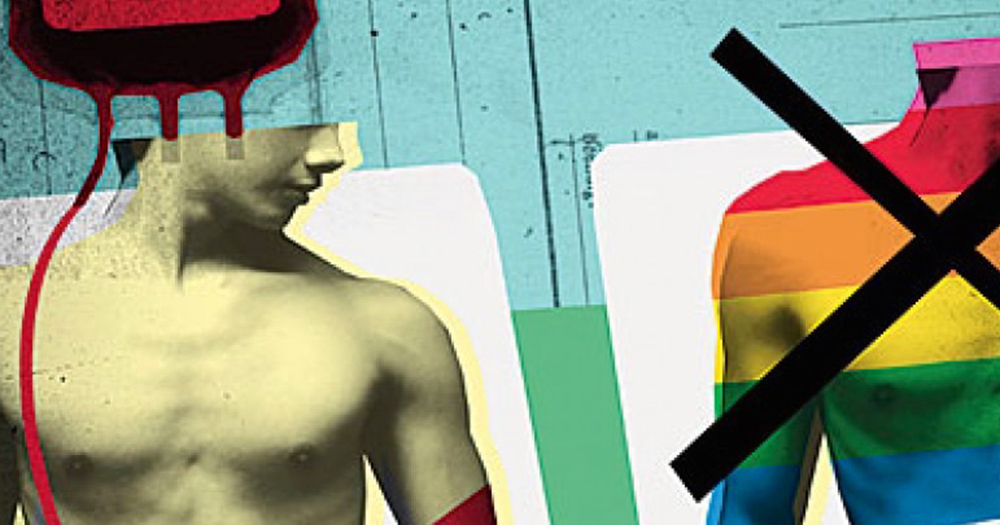After hundreds died due to the distribution of HIV-tainted blood from the national blood transfusion at the height of the HIV and AIDS epidemic, France became one of many European countries to ban gay and bisexual men from blood donation in 1983. In 2016, this extreme ban was dropped, allowing men who have sex with men (MSM) to donate blood after one year of sexual inactivity, garnering mixed reactions. This ‘deferral period’ will soon be reduced to four months, announced French Minister for Health Agnès Buzyn yesterday morning.
From February 2020, gay and bisexual+ men can donate blood if they are in a sexually monogamous relationship, or have abstained from sex for the past four months. This has been described by Buzyn as a “first step” to bring donor conditions for MSM in line with those for heterosexual men by 2020, pending a “transparent” evaluation of the potential risks involved.
The announcement was made one month after LGBT+ activist groups filed a complaint with the European Commission, denouncing the twelve-month deferral period as discriminatory as it “effectively excludes 93.8% of gay men from donating blood”. Along the same vein, the US Blood Equality Initiative states that these waiting periods “reinforce negative stereotypes about gay and bisexual people—particularly that AIDS and HIV is a ‘gay disease’.
“It supports the false perception that heterosexual people are at low risk for HIV infection, while allowing individuals who participate in high-risk behaviour, but who do not identify as gay or bisexual, to donate blood. This doesn’t make sense.”
France was one of many countries to have a twelve-month waiting period for male blood donors who have sex with men, amongst the United States, Australia, Japan and Sweden. However, in 2017, a report in the Australian scientific journal Transfusion stated that this “exceeds what is required to maintain blood safety”.
In fact, the researchers found that the current pace of screening technology meant that infection would only go undetectable in donors’ blood for less than one week. They expanded that “while there is a moral imperative to maintain blood safety, there is also a moral imperative to ensure that differential treatment of population groups with regard to donation eligibility is scientifically justified”.
Still, the health ministry in France do not seem to share this view – a representative recently proclaimed that “being able to donate blood is not a right, it’s a civic gesture that is subject to safety rules”. Furthermore, late last year, deputies in the French National Assembly also rejected a bill that would have placed equal restrictions to blood donation on all men, emphasising high-risk behaviour as opposed to sexual orientation.
These actions pass unquestioned thanks to a 2016 ruling from the European Court of Justice that allows governments to ban and restrict homosexual blood donors if they can prove it to be the best way to limit the risk of HIV infection.
The shorter waiting period certainly shows a step in the direction of inclusiveness, but Jennifer Power, researcher at La Trobe University’s Australian Research Centre in Sex, Health and Society, writes that these shortened deferral periods still reflect discriminatory attitudes in society – “a gay man who has been having safe sex, including within a monogamous relationship, is not necessarily at higher risk of acquiring HIV than a woman who has had multiple sexual partners and possibly unsafe sex.
“Yet a heterosexual woman is not banned from blood donation because she has had sex. Instead, heterosexual women are trusted to make their own assessment and accurate disclosure of their likely HIV risk. Gay and bisexual men are not.”
© 2019 GCN (Gay Community News). All rights reserved.
Support GCN
GCN is a free, vital resource for Ireland’s LGBTQ+ community since 1988.
GCN is a trading name of National LGBT Federation CLG, a registered charity - Charity Number: 20034580.
GCN relies on the generous support of the community and allies to sustain the crucial work that we do. Producing GCN is costly, and, in an industry which has been hugely impacted by rising costs, we need your support to help sustain and grow this vital resource.
Supporting GCN for as little as €1.99 per month will help us continue our work as Ireland’s free, independent LGBTQ+ media.
